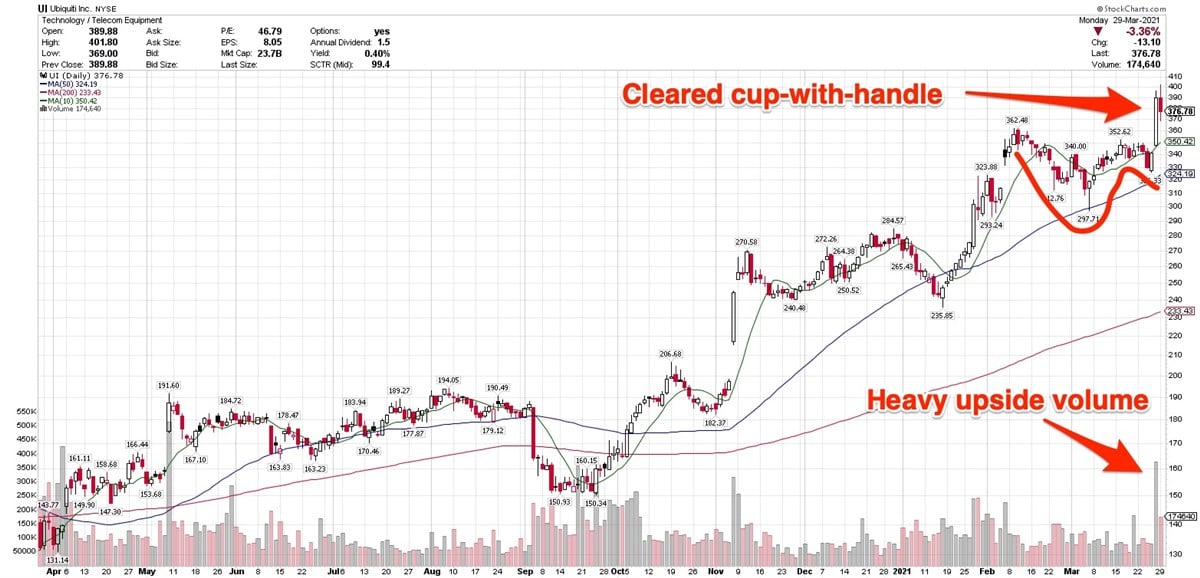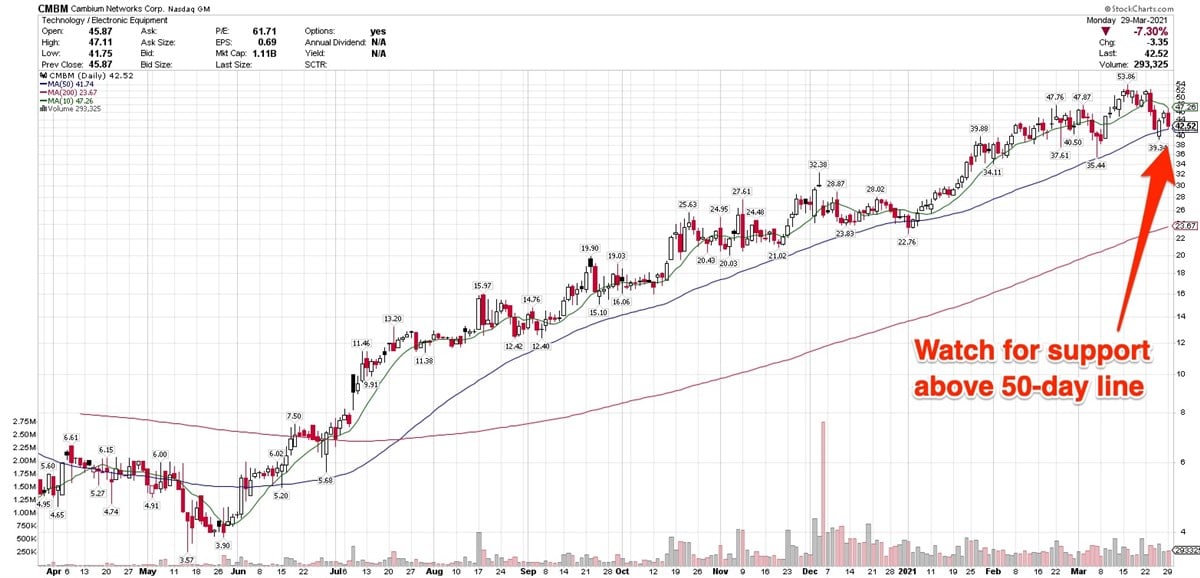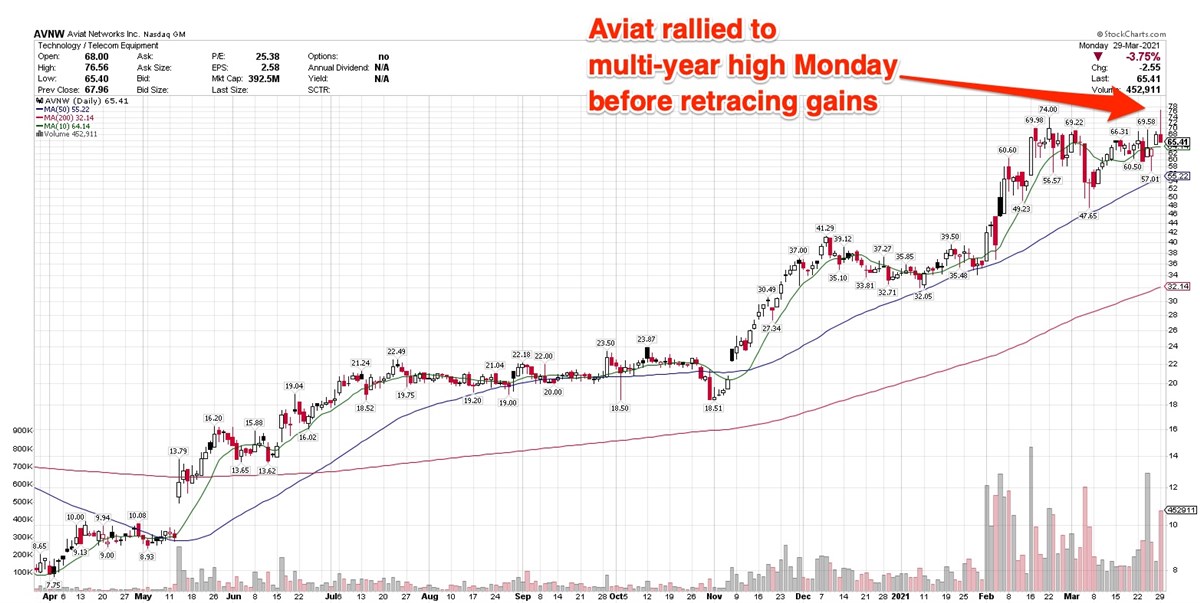When you think of the tech sector, what probably comes to mind are large caps that led the rally in 2020, not lesser-known stocks like
Ubiquiti Networks NYSE: UI,
Cambium Networks NASDAQ: CMBM and
Aviat Networks NASDAQ: AVNW.
All are involved in the telecommunications infrastructure business, a subset of the broader telecom industry. There are plenty of mostly unsung companies whose products constitute the backbone of Internet communications, whether for the end-user or for commercial applications.
It’s not the first time a not-so-glamorous telecom stock has been a strong performer. Back in the dot-com boom of the late 1990s, Cisco Systems NASDAQ: CSCO was a high flier.
In fact, Cisco recently broke out of a flat base, clearing a buy point above $49.34 in light volume, before jumping more than 4% on March 26, after Goldman Sachs upgraded the stock to buy. Goldman’s analyst cited optimism about growing networking spending as employees return to the office.
Cisco, which has a market cap of $222 billion, grabs attention. But here how some smaller telecom infrastructure stocks are faring.
Ubiquiti Networks is a maker of wireless and wired data communications gear for homes and businesses. It sells its products under several brand names, the largest brand being UnFi networking equipment.
Shares popped 14.15%, or $48.32 Friday in triple average turnover. The stock retraced some of those gains in Monday’s session, in volume below Friday’s levels, but still above average.
While Goldman Sachs took a positive view on Cisco as a back-to-the-office leader, analysts and investors liked Ubiquiti for its strength as a work-from-home stalwart. In particular, Ubiquiti’s business of selling wireless networking gear to providers outside large urban areas, as well as overseas, may be future growth drivers.
In its latest earnings report, the company said a possible headwind may be continued tariffs on gear the New York-based company imports from China.
Nonetheless, Wall Street expects earnings of $9.03 per share this year, which would be a gain of 53%.
In the most recent quarter, the company earned $2.53 per share, up 81% from a year ago. Revenue was $479.4 million, a gain of 56%. Ubiqiuti did not offer forward earnings guidance.
With Friday’s price action, the stock zoomed out of a five-week cup-with-handle pattern. Monday’s pullback may offer a chance to buy before the stock becomes too extended, but investors should be sure the stock continues to trend higher after the breakout, rather than sliding beneath key moving averages.

Cambium Networks is a smaller, newer rival to Ubiqiuti. The company went public in 2019, and has a market cap of $1.1 billion, placing it squarely in small-cap territory.
The company, which makes wireless broadband gear for business customers, was spun off from Motorola NYSE: MSI in 2011. Like Ubiquiti, this company is also focusing on rural areas.
It recently inked deals to provide high-speed Internet access to tribal communities in remote locations in five western states. It also signed a multi-year agreement with a school district in rural North Carolina for high-speed classroom Internet.
The stock posted gains in nine of the past 10 months. It closed Monday at $42.52, down 7.3%, or $3.75 in below-average volume. The stock found support above its 50-day line.
The stock has been showing wider intraday trading ranges since August, with that trend only accelerating in subsequent months. Short interest grew by 24% recently, which is something to watch out for. Investors should understand that this could indicate bearish sentiment, at least for the short term.
On the plus side, Wall Street has high expectations for Cambium, pegging earnings per share at $1.25 this year, a projected 45% increase. That consensus estimate was increased recently.

Aviat Networks is an even smaller company in the telecom infrastructure category, clocking in with a market cap of just $363.9 million. The company sells routing and networking gear and a range of wireless transport products and services to mobile providers, government agencies and other enterprise customers.
The stock is up 6.65% in March, closing Monday at $65.41. Monday’s price action brought a high of $76.56, its best level in 11 years, but after rallying to that high early in the session, it spent the rest of the day trending lower, closing at the bottom of the session range.
But one session does not make a trend, and this stock’s performance over the past year makes it one to watch. It’s up 714.57% over the past year, and 91.54% year-to-date.
That doesn’t mean it’s necessarily one to buy right now. The stock is looking a bit frothy after those monster gains, and may be due for a correction. Even after Monday’s price action, it’s extended 18% above its 50-day average, and 2% above its 10-day line, so it’s nowhere close to correction territory yet. However, investors should keep an eye on its behavior in the coming sessions to see whether it resumes the uptrend, supported by heavier trading volume, or if it continues to slide.
Earnings growth has been accelerating during the pandemic, after a slowdown in 2019. Analysts expect a 180% increase in earnings growth this year, to $4.23 per share.

Before you consider Ubiquiti, you'll want to hear this.
MarketBeat keeps track of Wall Street's top-rated and best performing research analysts and the stocks they recommend to their clients on a daily basis. MarketBeat has identified the five stocks that top analysts are quietly whispering to their clients to buy now before the broader market catches on... and Ubiquiti wasn't on the list.
While Ubiquiti currently has a "Hold" rating among analysts, top-rated analysts believe these five stocks are better buys.
View The Five Stocks Here
MarketBeat's analysts have just released their top five short plays for January 2025. Learn which stocks have the most short interest and how to trade them. Click the link below to see which companies made the list.
Get This Free Report